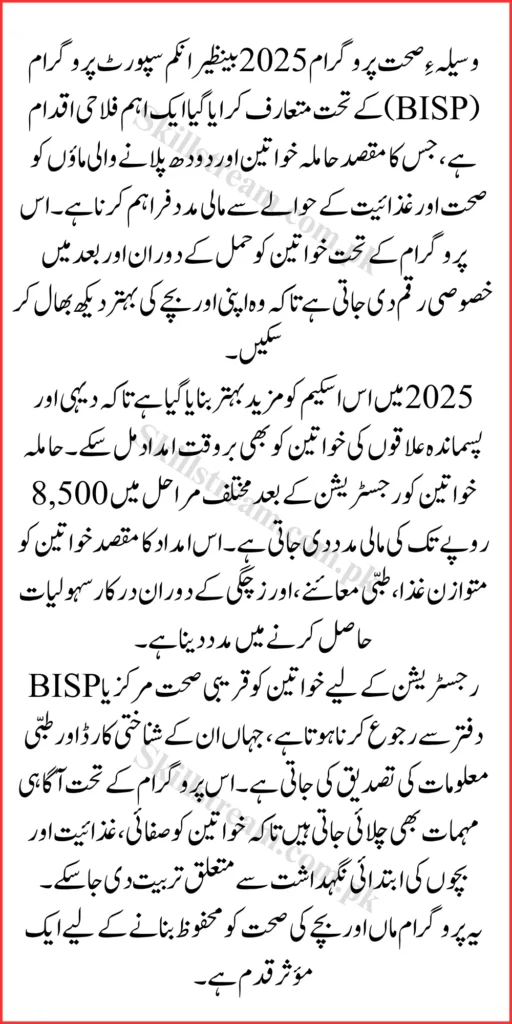Maternal health is at the heart of social welfare, and in 2025, Pakistan’s Waseela‑e‑Sehat program under BISP continues its vital mission of supporting pregnant and lactating women through targeted cash assistance. This initiative, aligned with the broader Benazir Kafalat Program, focuses on improving maternal nutrition, ensuring safe pregnancies, and reducing infant mortality. With updated guidelines and streamlined distribution systems, understanding how to access and benefit from this support has never been more important.
In this guide, we’ll walk through everything you need to know about Waseela‑e‑Sehat 2025, including eligibility criteria, payment structure, enrollment steps, and practical tips to maximize impact on maternal and child health.
Why Waseela‑e‑Sehat Matters in 2025
Maternal and child nutrition remains a pressing challenge in Pakistan. Even as economic conditions shift in 2025, many expectant mothers face food insecurity, inadequate prenatal care, and limited access to health services. Waseela‑e‑Sehat bridges this gap by providing regular cash support to pregnant and lactating women under BISP eligibility, helping them afford nutritious food, prenatal vitamins, and medical consultations.

This timely assistance plays a crucial role in:
- Boosting maternal health and reducing complications.
- Supporting early childhood development.
- Strengthening gender-focused welfare priorities.
Also Read About : BISP Shop Timings 2025 – Your Complete Guide to Collect Payments Without Delays
Who Is Eligible for Waseela‑e‑Sehat 2025?
To receive cash support under Waseela‑e‑Sehat 2025, beneficiaries must meet the following conditions:
- Woman must be pregnant or a breastfeeding mother.
- She must already be enrolled in BISP’s Benazir Kafalat Program. This ensures they fall within targeted income brackets.
- Compliance with routine health checkups at designated healthcare facilities throughout pregnancy and early postnatal period.
Once a pregnant woman registers at a BISP-affiliated health center, she becomes eligible for periodic cash installments upon completing essential maternal health milestones such as antenatal visits and neonatal checkups.
Also Read About : How to Check BISP 8171 Payment Eligibility in 2025 – Easy SMS & Web Portal Guide for Families
Cash Support Structure
As of July 2025, the Waseela‑e‑Sehat cash support plan is structured as follows:
- Prenatal Tranche: A cash installment during early pregnancy (typically first and second trimester), encouraging early care engagement.
- Pre-Delivery Tranche: A second installment when she nears term, reinforcing preparedness for safe delivery.
- Postnatal Tranche: A final payment in the early months after birth, targeting lactation support and newborn health.
Total cash support adds up to around Rs.7,500 to Rs.10,000 per pregnancy cycle. Actual amounts and number of tranches may vary slightly by province, but the underlying goal remains consistent empower mothers to prioritize their health and that of their babies.
Also Read About : BISP Eligibility Districts in 2025 – Latest Region-Wise Guide to Qualify for Support
How to Register for Waseela‑e‑Sehat
Here’s a streamlined path to access this program:
- Confirm your BISP Kafalat status by SMS/8171 portal or visiting your local BISP office.
- Visit a certified healthcare facility (like Basic Health Unit or Partner Hospital) upon confirming pregnancy.
- Upon confirmation of pregnancy, the health center will register you into the Waseela‑e‑Sehat system, linking records to BISP.
- With each required health visit, you’ll receive SMS notifications indicating an upcoming cash disbursement.
- Collect your cash through registered BISP outlets following confirmation of your health appointment.
Also Read About : How to Receive Full BISP Payment Without Any Deductions in 2025 – Your Trusted Guide
Maximizing Your Benefits
To fully benefit from the program, consider these practical tips:
- Attend every scheduled check-up and ensure dates are accurately recorded.
- Keep your CNIC and mobile number active, and update NADRA/BISP records if changed.
- Bring maternity health cards to each visit these are official proof of participation.
- Ask health workers about nutrition guidance; many facilities provide dietary advice alongside registration.
- Track your installment status via SMS or the 8171 helpline regularly.
Challenges and Ongoing Improvements
Despite its success, Waseela‑e‑Sehat faces operational challenges:
- In rural areas, long distances to health centers may hinder regular follow-ups.
- Miscommunication between facilities and BISP sometimes delays payments.
- Some beneficiaries remain unaware of program details, highlighting the need for improved community outreach.
In response, BISP has ramped up mobile health camps, partnered with NGOs for awareness drives, and upgraded its digital registration system to reduce delays.
Also Read About : Track Your July 2025 BISP Balance by CNIC – A Clear and Friendly Step-by-Step Guide
Final Words
In 2025, Waseela‑e‑Sehat under BISP continues to be a lifeline for pregnant and lactating women across Pakistan. By linking cash support with mandatory health visits, the program encourages better maternal nutrition, safer deliveries, and stronger early childhood health outcomes. Staying informed, proactive, and consistent in your adoption of the program ensures you reap its full benefits empowering your health and your family’s future.
FAQs
1. How much total cash support is provided under Waseela‑e‑Sehat 2025?
Beneficiaries receive between Rs.7,500 and Rs.10,000 across three installments: prenatal, pre-delivery, and postnatal, depending on provincial roll-out.
2. Can a woman participate in Waseela‑e‑Sehat if she’s not pregnant yet?
No. Only confirmed pregnant women or new mothers enrolled in BISP Kafalat are eligible. Registration starts upon pregnancy confirmation.
3. What happens if I miss a scheduled health visit?
Missing a registered health checkup could delay payments for that tranche. Check immediately with the healthcare facility and BISP for clarifications.
4. Do nutrition counseling sessions come with the program?
Yes, certified health centers often offer dietary advice as part of maternal checkups, though specifics vary by location.
5. How long after delivery can I receive the postnatal installment?
Typically, the postnatal cash support is disbursed within the first three months after delivery, following your final neonatal visit.
Also Read About : BISP and Girls’ Education in 2025: How Cash Transfers Are Boosting School Attendance

